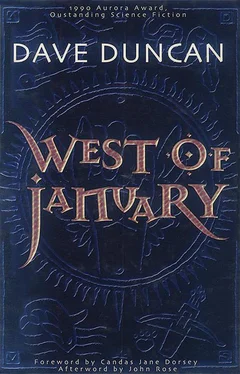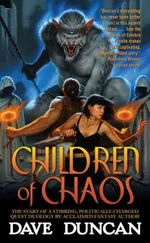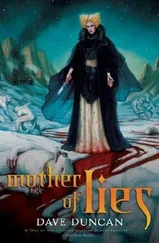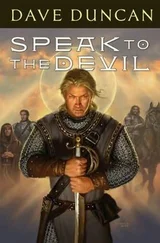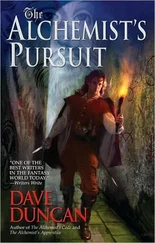Two-green-red had sent them, they announced breathlessly, to lower a cripple down to ground level.
I rejected that offer with a few corrosive expressions I had learned in the ants’ nest, which earned their instant approval. Then I went outside, lay down on the platform, and prepared to break my back on the ladder or the jagged tree stumps below it. I didn’t, and by the time the cherubim were tucking me in on a dogsled, they were already addressing me as Old Man. They had been too considerate to offer sympathy, but they had granted me patience, which was all I wanted. They must have spread the word afterward, I suppose, and it must have become an immediate tradition, for thereafter the cherubim always behaved that way toward me.
We set off then on a hair-raising twilight ride through fungus jungle and dead trees, through looming rocks and flying snow. Snortoises bellowed unseen all around, dogs yowled, and young men yelled insults. I just sat with my eyes closed and a fixed smile on my face until we arrived at the cherubim feeding trough, a room invariably referred to by the name of its snortoise, Cloud Nine.
There I found Quetti already boxed in a corner, being plied with beer and questions by a dozen or so cherubim and a few angels. Forced from his usual reticence, he seemed mainly to be telling more lies about me. As soon as I had taken the edge off my hunger and thirst, therefore, I began to relate some of Quetti’s own exploits. His prowess with women was noteworthy, as I have said, but I raised it now to the status of legend, making the younger cherubim in the audience wide-eyed and their more discerning elders purse-lipped. Quetti’s less salacious tales were soon finding few listeners and no believers.
In one hundred cycles Heaven has seen almost anything possible, but imposter angels were new. The audience varied as men came and went, and the two of us were kept there talking until we were both ready to fall off our chairs. I felt as if I had recounted my whole life story three times before we were at last released and escorted over to Nightmare, the snortoise that bore the cherubim’s dormitory.
Heavenly beer is not especially potent. Quetti and I had learned during our long trek to accept hospitality with moderation, so I am certain we had both been discreet when describing the death of Red-yellow-green. Yet before that long meeting ended, the cherubim, with deadly intuition, were addressing Quetti as “Snake.” He accepted the name with placid amusement, as if it were a compliment, and Snake he remained until he became an angel.
I was the Old Man. Some time later, while learning to use snow-shoes, I earned a second name. Snowshoes are tricky even for a man with real knees. Although I eventually became proficient on them, my early attempts caused me to thoroughly lose my temper. One of the spectators, a young swampman named Tiny, grew intolerably raucous over my tangled efforts to walk.
“Faster than the wind,” he exclaimed, “it moves over the grasslands in mighty bounds!”
I swung at him, missed, and fell headlong. Thereafter I was still the Old Man, but I was also known as Roo.
─♦─
Then there was Kettle. Right after a long first sleep and a hearty second meal, Quetti and I were taken in hand by the saints. I think Quetti was given his first reading lesson, but Gabriel was howling for information on the ants’ nest, so I was cross-examined by a team of six. They came at me in relays, hurling questions until my head spun. It seemed to take half a lifetime.
That was in the scriptorium, an unusually large and bright room, well outfitted with windows and drippy skylights, but always so crowded with chests and desks that there was barely room to move. There the saints fought an unending battle to copy out ancient records before the damp of Dusk rotted them all away. The air reeked of mold, and there were insects. Young men with good eyesight struggled alongside old men with experience, striving to decipher crumbling paper or sodden leather. The most valuable texts have been transcribed onto gold-plated shell slabs, but there is a limit to the weight the snortoises can transport.
Weight has always been Heaven’s problem, as Kettle explained to me soon after the questioning had ended.
He took me off to his own cell, a nook of highly irregular shape that was even more cluttered than the scriptorium. Bundles of old manuscript were mixed in with discarded garments, and there was barely room to stand, let alone sit. The bed itself was heaped with books and a laptop desk and brass instruments for observing the stars. I was never to see it in any other state, and I eventually concluded that Saint Kettle, if he slept at all, must sleep standing up. He cleared a place for me on the end of the bed and squeezed his portly form onto one corner of a chest. And beamed at me.
“Where do you want to start?” he asked.
“Where do I want to start what?”
He looked surprised and waved a hand at the chaos. “Learning.”
“Is a herdman capable of learning?”
“That depends on what sort of herdman!” Chuckling, he bent over to scrabble through a heap of things on the floor, rising red-faced with a relatively neat and respectable ledger. He found the page he wanted and held the book out to me. I took it, surprised at its weight, and stared in incomprehension at the thousands of tiny, close-packed squiggles and at one large and unsightly ink blot.
“What does this mean?” I asked crossly. I had only a very hazy idea of writing, even then. “What use is this? Someone has been very careless.”
“Yes, that happens,” Kettle sighed. “It’s quite impossible to read what was written underneath. That page tells on an expedition sent out a long time ago…before you were born, certainly. Four chariots went across the grasslands to Dawn, to the wetlands. Purple-white-blue, Green-red-orange, Indigo-two-black…and now the fourth name can’t be made out at all! Not that it really matters, of course.”
He was prying, wanting to see my reaction, and I in turn was studding his baggy brown face. He was still smiling, and I did not detect a threat, which have must been one possibility. “You ought to report that blot to Michael.”
Kettle shook his head, swinging jowls. “Michael needn’t worry about such details. Nobody else need, either, in my opinion.”
“So who’s the enemy?”
His eyes twinkled. “Gabriel and Raphael. They don’t like some of the innovations that Michael is trying to make.” He explained about the five archangels and their unending rivalries.
“So why antagonize Uriel?”
“Uriel is one of Michael’s—this present Michael’s—own appointees, and he’s starting to waver, so it’s said. The meetings are private, of course, but the story is that he sided with the opposition in the last vote.”
“So why antagonize him?” I asked again.
Kettle chuckled. “Michael doesn’t need to bribe. He rewards or punishes. You watch him! He’s a master.”
Yes, I thought, I might well learn a thing or two by watching Michael.
I dropped my eyes to the book, to tales of things that had happened before I was born, to the deeds of men who might be dead by now. The tiny script seemed to dance before my eyes like midges. I thought of Misi’s delicate embroidery. I had never managed to match her at it…but I had learned to sew, after a fashion. I thought of the heaped documents I had been shown, full of the voices of the long-dead, full of wonderful things. I shivered at the thought of being able to hear those voices and see those things.
But reading would be of no use to me back on the grasslands.
I closed the book. “Tell me about the Great Compact.”
Kettle looked disappointed. “The Compact? Then I must speak first of the firstfolk…and therefore of time. How much do you know of time?”
Читать дальше
